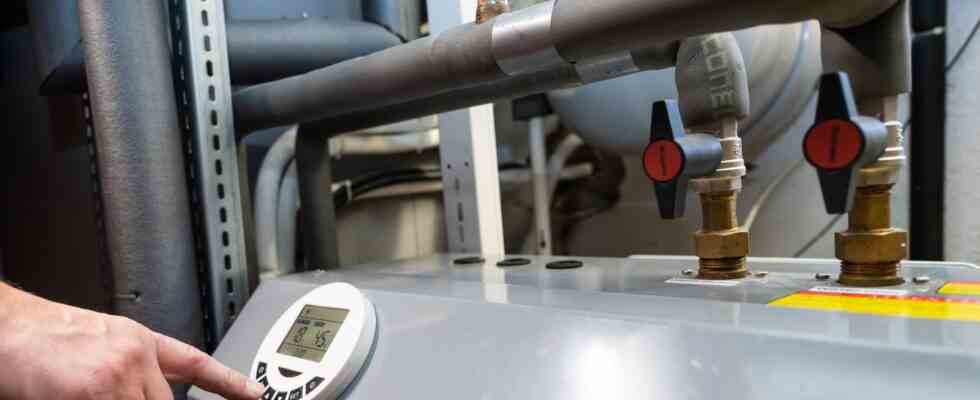FAQ
Status: 08/03/2022 08:44 a.m
Many property owners now want to modernize their heating system. What grants are there? Which boilers need to be replaced – and by when?
By Antonia Mannweiler, tagesschau.de
Do owners have to part with their old gas and oil heating systems?
Not mandatory – but boilers that were installed before 1992 or are older than 30 years may no longer be in operation according to the Building Energy Act (GEG) and usually have to be replaced by more efficient systems. This applies to heaters with a so-called constant temperature boiler and a rated output of four to 400 kilowatts (kW). The temperature of such boilers is constantly high and can only be adjusted to a limited extent. They are therefore less efficient than condensing boilers, for example, which use less gas.
Are there exceptions to the exchange obligation?
Owners of detached or semi-detached houses who have lived in their own house since February 1, 2002 do not have to replace their old boilers. However, this only applies as long as the house has only one apartment. If the house was inherited or acquired after the deadline, the old gas and oil heating systems must be replaced. The new owners then have two years to replace their old heaters with new ones, otherwise they face high fines.
Can new oil and gas heaters still be installed?
In the coalition agreement, the traffic light government had actually stipulated that from 2025 all newly installed heating systems must be operated with a minimum share of 65 percent renewable energies. The coalition partners now want to bring this date forward to January 2024. The concept paper presented in July is to be discussed by the end of the month. The installation of pure oil or gas heating systems would then be banned from 2024.
However, this does not correspond to a complete ban on gas and oil heating. Heating systems that have already been installed may continue to be operated in 2024, unless they are older heating systems that require replacement.
By 2045, however, all heating systems are to be completely converted to renewables. And the service life of the existing heating systems is also to be gradually limited from 30 to 20 years. Around half of all apartments in Germany are currently still heated with gas.
What grants are there for replacing old heaters?
Until recently, the installation of new gas hybrid and gas condensing heating systems (renewable-ready heating systems) was subsidized with up to 40 percent. From August 15, however, this will be over: then the funding for all gas-powered heating systems will be discontinued. A corresponding change came into force at the end of July. Anyone who wants to replace their oil heating system with a gas hybrid heating system will only receive a subsidy from the state until August 14th.
Who do I contact for a grant?
Homeowners must apply for the funds at the Federal Office of Economics and Export Control (BAFA). Applicants can regularly check their processing status on the website. The state subsidies are summarized under the federal subsidy for efficient buildings, BEG for short.
What other regulations will come into effect from August 15?
The state continues to provide financial support to owners who want to replace their old heaters with more climate-friendly alternatives. However, the subsidy rates for this will drop significantly by five to ten percent from mid-August. For solar collector systems there is only 25 percent instead of the previous 30 percent. So far, the maximum subsidy rate for the installation of a heat pump was 50 percent, from mid-August it will shrink to 40 percent with an upper limit of 60,000 euros per residential unit. Then applicants can get a maximum of 24,000 euros reimbursed compared to 30,000 euros previously.
What is new, however, is the so-called heating exchange bonus of ten percent, which is paid in addition to the regular subsidy rate. Owners thus receive a kind of special bonus for switching to resource-saving heating alternatives. The bonus thus replaces the previous exchange bonus for oil heating systems. It is paid when oil, coal and night storage heaters that are still intact are replaced. A prerequisite for the bonus when replacing gas heaters is that they must be older than 20 years. According to the Ministry of Economic Affairs, the old systems are the focus of the measures because they consume a lot of energy.
In addition, owners can only submit one application for funding to BAFA in the period up to August 14th. However, this can contain several support measures.
Why were the measures adjusted?
The Federal Ministry of Economics justifies the adjustments with the fact that the dependence on Russian gas and oil should be reduced. It was said that consuming less energy was the cheapest and most efficient way to contribute to more independence and more climate protection. In addition to regulatory requirements, the incentives are an essential key.
However, the subsidy rates have also fallen for economic reasons – in order to be able to make the subsidies available to more people. “In the future, the individual will receive a little less funding than before, but many people can benefit from the funding programs. This is indicated in times of high energy costs,” said Federal Minister of Economics Robert Habeck (Greens). “Most people live in older houses. Renovating now, replacing windows, throwing out the gas heating – that helps to save costs.”
The demand for the subsidy is unbroken: in the whole of last year, eight billion euros were spent nationwide on energy-related refurbishments. This amount was already exceeded in the first half of 2022, with 9.6 billion euros being paid for renovation funding up to July alone.

